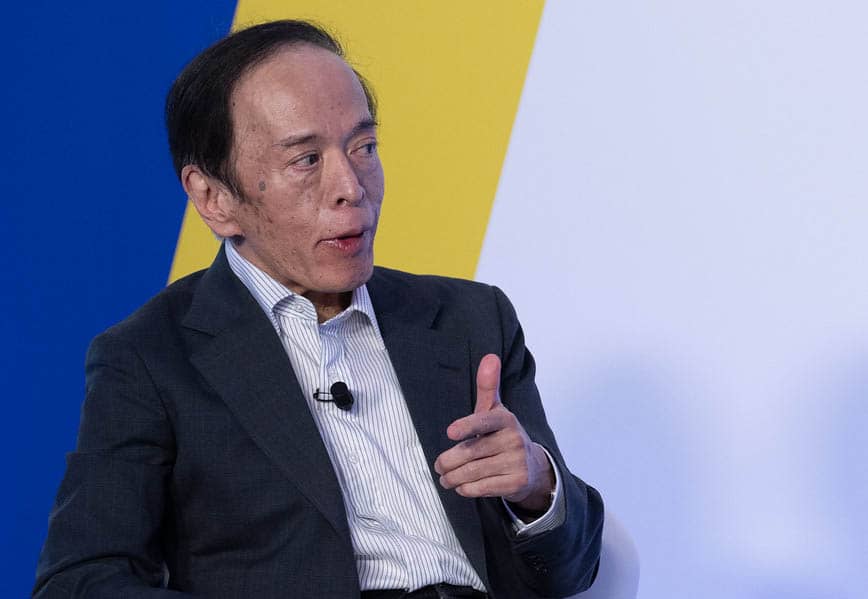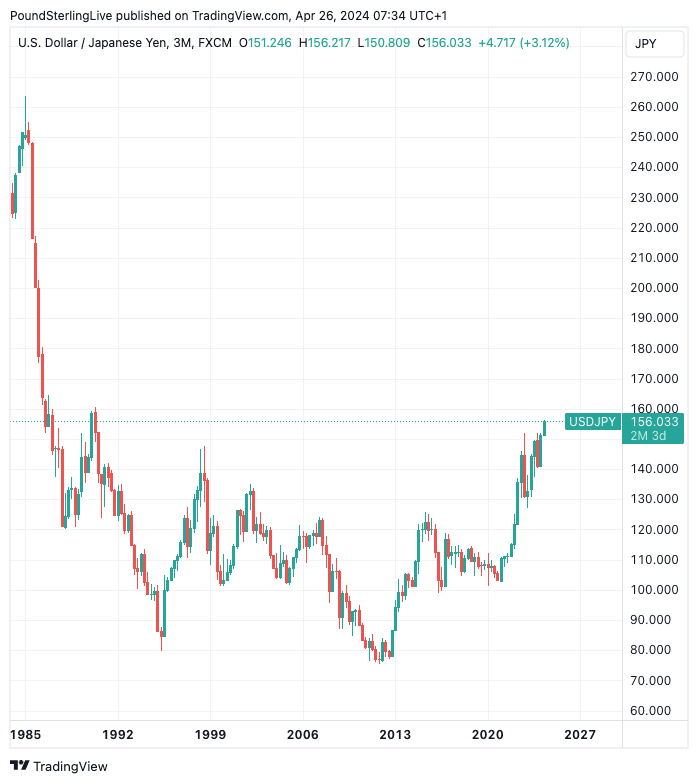Pound-Yen Rate Leaps to 2015 Highs on Limp Bank of Japan Statement
- Written by: Gary Howes

Above: File image of Kazuo Ueda, Governor at the Bank of Japan. © Sérgio Garcia/Your Image for ECB.
The Japanese Yen was sold across the board after the Bank of Japan confirmed it would continue with an age-old policy of ultra-low interest rates and continue to buy government bonds.
The Pound to Yen exchange rate charged higher to 195.19, its highest level since 2015, despite the Bank saying it believes inflation risks in Japan are tilted to the upside.
But the market will only stop selling the Yen if it believes the Bank of Japan is about to hike on a number of occasions and at least stop quantitative easing (the purchase of bonds aimed at keeping their yield down, which helps the government out).
None of these fundamental changes are forthcoming.
The Dollar-Yen was at 156, its strongest level since 1990, in a clear sign that Japan is out of kilter in a world where interest rates have risen to multi-decade highs and quantitative easing has long been abandoned. You cannot be so out of step with your peer nations and expect to have a strong currency.
The Bank's statement accompanying the 'no change' policy was nevertheless interesting as it introduced a slimmed-down communication.
Regarding the inflation outlook it said: "Risks to prices are skewed to the upside for fiscal 2024 but are generally balanced thereafter." For your typical G10 central bank this would imply the prospect of a potential further interest rate hike, but when it comes to the Bank of Japan, the bar is set so much higher.
Above: GBP/JPY at three-month intervals. Track GBP/USD with your own custom rate alerts. Set Up Here
"We think that the Bank will only hike rates once at its July meeting," says Marcel Thieliant, Head of Asia-Pacific at Capital Economics. "The Bank will find it increasingly difficult to lift interest rates further once underlying inflation falls below its inflation target. We still expect inflation excluding fresh food to fall below 2% in the second half of the year."
Ulrich Leuchtmann, Head of FX and Commodity Research at Commerzbank, makes an interesting point in that the Bank of Japan didn't react at all to the 2021/22/23 inflation shock, which led to inflation rates above 4% in Japan.
"That went by without a single rate hike. If inflation risks are now identified that remain limited to 2024, it takes a lot of imagination to see how the BoJ will respond," he says.
Speculation about the end of bond purchases - long abandoned by other developed market central banks - was misplaced.
Above: USD/JPY at three-month intervals.
"I think the JGB purchases are a necessity because of fiscal constraints," says Leuchtmann. By buying government and corporate bonds, the Bank of Japan creates the demand required to keep the interest payments on these bonds as low as possible.
But this also means it is very attractive to borrow in Yen and invest elsewhere in the world, creating significant JPY selling pressures.
"The market reacted to the BoJ announcement with another round of JPY weakness, pushing the USD-JPY exchange rate even above the 156 level. This is the level that's talked about in the FX rumour mill as the point at which FX intervention could occur," says Leuchtmann.
But the country's finance minister - who would oversee in any kind of currency intervention - avoided talk of any imminent intervention.
Speaking on Friday, Shunichi Suzuki said he was not pleased about the Yen's depreciation, but he did not describe recent moves as excessive.
The Ministry of Finance has long signalled that it would only intervene in response to "excessive" movements. "If USD-JPY stays just above 156 in the next few hours without FX intervention, it's likely that FX traders will test even higher prices. After Suzuki's comments, this will no longer require superhuman courage," says Leuchtmann.
Traders see a clear runway to further JPY weakness.


